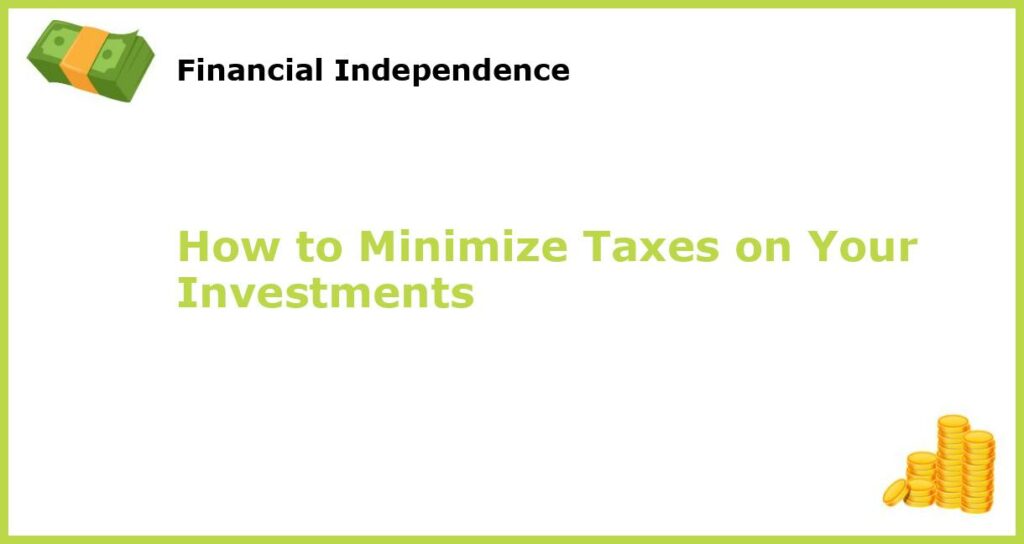Investing your money is a great way to increase your wealth. It’s a wise move. However, investing wisely also means minimizing your tax liability. You don’t want to end up giving a large share of your gains to the government. The good news is that are ways to do just that. Here are some tips on how to minimize tax on your investments.
Choose tax-efficient investments

Not all investments are made equal. Some investments are more tax-efficient than others. Look for investments that have low turnover rates and don’t distribute a lot of taxable income or capital gains. Enter index funds. Index funds are typically cheaper, more diversified and they have lower turnover rates than other funds, which reduces their tax exposure. They also tend to hold onto their investments for the long term. So, you will end up paying fewer taxes over time. Municipal bonds can also be tax-efficient because the interest payments they generate are often tax-free. Choose investments that give you the best returns while minimizing taxes.
Use a tax-deferred account

A tax-deferred account is a retirement account that lets your investments grow tax-free until you withdraw the money. Examples of such accounts include 401(k)s, traditional IRAs and Roth IRAs. Contributions made to these accounts are tax-deductible, meaning the amount invested goes into the account before taxes are taken out. The account will grow tax-free until you withdraw the funds. A tax-deferred account is an excellent way to minimize taxes since contributions are made with pre-tax income, and the account grows tax-free. There are limitations on how much you can invest in these accounts but they can save you a significant amount of money on taxes over time.
Take advantage of tax-loss harvesting

When you have investments that have lost value, you can sell them and use the losses to offset any gains you’ve realized. This can reduce your tax liability in the short-term. You can use the losses to offset both long-term and short-term gains on your tax return or carry them over to the next year. Just make sure that you wait at least thirty days before repurchasing the same or similar security. This ensures that the sale is not considered a “wash sale” and disallowed by the IRS. Tax-loss selling is one tax strategy that every investor should know.
Hold investments for more than a year

If you hold investments for more than a year, any gains you make will be taxed at a lower, long-term capital gains rate. Unlike short-term gains which are taxed at your ordinary income tax rate, long-term capital gains are taxed at the reduced capital gains tax rate. This can significantly reduce your tax liability. So, aim to hold onto your investments for a year or more to take advantage of this tax break.
Don’t be afraid to invest abroad
International stocks can diversify your portfolio and potentially increase your returns. They offer an opportunity to invest in growing economies, benefiting from the growth of companies and the advancement of technology. Although investing abroad can come with its fair share of tax complexities, with some careful planning, you may be able to minimize your tax liability on these investments as well. To do this, research tax treaties between the US and the foreign country you’re investing in beforehand. This will help you understand the tax implications of your investment decisions. You can also use foreign tax credit to offset your US tax liability on your foreign income.
Avoid mutual funds with high turnover rates
Mutual funds that have high turnover rates are more likely to distribute capital gains and other taxable income to shareholders. This can lead to increased taxes for you. Look for funds with lower turnover rates to minimize your tax liability. A fund with low turnover rates means less activity within the fund, which reduces the number of transactions, lowering the chances of the fund manager realizing taxable gains on your behalf. Lower turnover rates mean fewer realized gains and, by extension, a lowered tax bill.
Consider a Roth account
A Roth account is another tax-efficient retirement account. Contributions to a Roth IRA are made with after-tax dollars, but once the contributions are made, they grow tax-free, and all withdrawals upon retirement are tax-free as well. This can be a great way to minimize your tax liability in the long-term. One of the great benefits of a Roth account is that unlike traditional accounts that require you to take required minimum distributions at age 70½, Roths do not require this. This feature makes Roths ideal for those looking for flexibility in retirement planning, tax efficiency and lifetime giving.
Watch out for short-term gains
Short-term gains, meaning gains on investments you’ve held for less than a year, are taxed at your ordinary income tax rate. It can be tempting to take advantage of opportunities to make quick gains. However, the tax implication could make investing -and keeping- for the longer term more attractive. Try to hold investments for longer periods of time to avoid short-term gains. Holding your investments longer can ensure that you enjoy lower long-term capital gains tax rates, reducing your overall tax burden.
Work with a financial advisor
Navigating the complex world of taxes and investments can be daunting, which is why working with a financial advisor can be valuable. A qualified financial advisor can help you create a tax-efficient investment strategy that minimizes your tax liability without sacrificing your investment goals. Your financial advisor can also provide you with more specific, customized advice for your individual tax situation. Additionally, your advisor will keep you informed of and help you keep up with any changes in tax laws that could affect your investment decisions.







